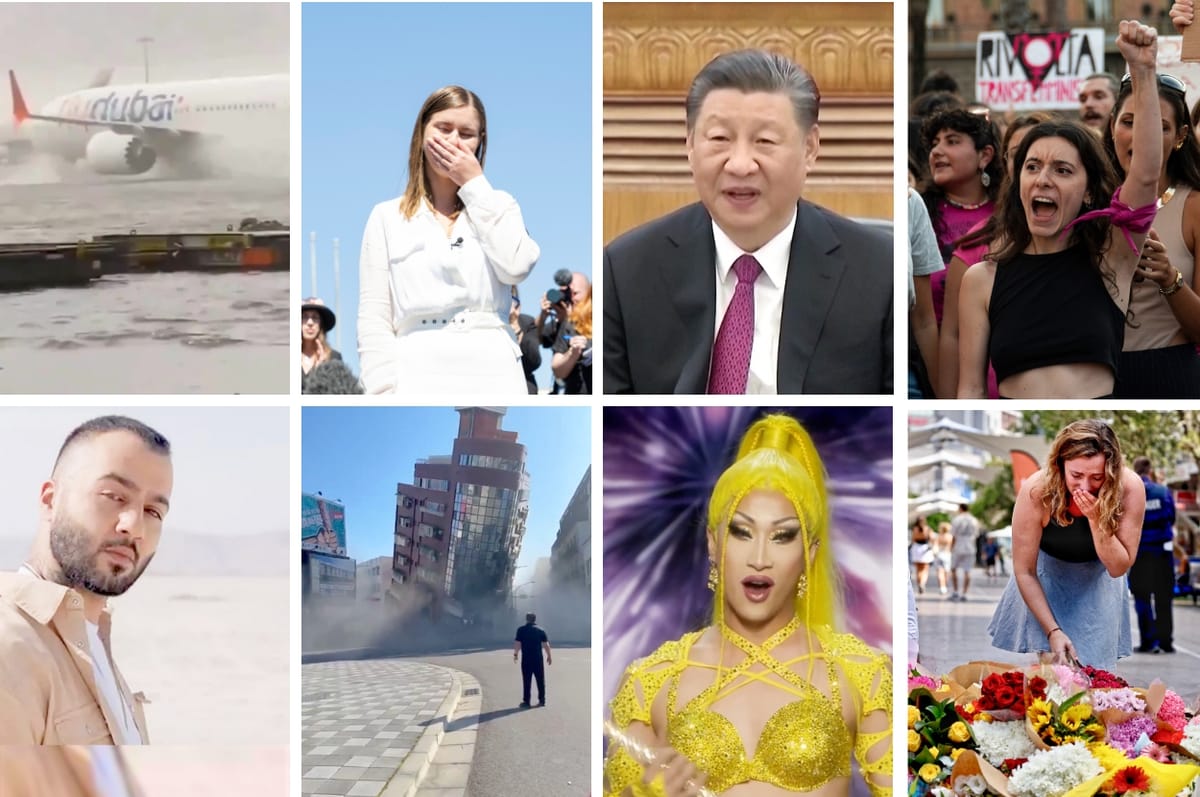Here’s What Happened Around The World In May 2024
Take a look back at some of the major global news events that happened in May 2024.

Take a look back at some of the major global news events that happened in May 2024.
1. Taiwan’s new president called on China to stop threatening Taiwan, saying the two countries “don’t belong to each other”
In his first speech after being inaugurated, Taiwan’s new president William Lai has called on China to stop threatening Taiwan.
The 64-year-old, who served as the vice president under Taiwan’s first woman president Tsai Ing-wen, was elected in January, making their party, the Democratic Progressive Party (DPP), the first party to win three consecutive terms in Taiwan’s history.
In his inauguration on Monday May 20, Lai began by thanking Tsai for paving the way for the past eight years.
“When I was young, I aspired to become a doctor and save lives,” Lai said. “When I entered politics, I aspired to change Taiwan. Now, standing here, I aspire to strengthen our nation.”
He called on China to stop its “cognitive warfare and military intimidation against Taiwan and play its role in maintaining peace and stability in the Taiwan Strait and the region and ensuring that the world is free from the fear of war.
2. China then simulated a full-scale invasion of Taiwan to “punish” the country for electing him
China simulated a full-scale invasion of Taiwan to “punish” it for electing another pro-independence president.
In his first speech, Lai called on China to stop threatening Taiwan and said the two countries “don’t belong to each other”.
Three days later, on May 23, China deployed dozens of fighter jets and naval vessels around Taiwan and conducted mock attacks over two days.
It also held military drills on four Taiwanese islands that are close to the Chinese coast for the first time.
3. Iran’s hardline president was killed after his helicopter crashed in the mountains
Iran’s hardline president Ebrahim Raisi and his foreign minister have been killed in a helicopter crash while crossing the mountainous terrain near the Azerbaijan border.
Raisi was viewed as a close associate and possible successor of Iran’s Supreme Leader Ayatollah Ali Khamenei.
Since winning the presidency in 2021, Raisi has tightened “morality” laws, brutally suppressed anti-government demonstrations and took a firm stance on nuclear discussions with international powers.
Known for his hardline views, he became widely unpopular over the death of 22-year-old Mahsa Amini and the authorities' crackdown on the subsequent protests.
On Sunday, May 19, the helicopter carrying the 63-year-old president crashed during his flight returning to Tabriz after inaugurating the Qiz Qalasi Dam with Azerbaijani president Ilham Aliyev on their shared border.
The chopper, which was carrying Raisi, foreign minister Hossein Amir-Abdollahian and six other officials, lost communication just 30 minutes after takeoff.
4. Liechtenstein legalized same-sex marriage
Liechtenstein has legalized same-sex marriage.
Same-sex partnerships have been legal in Liechtenstein, a tiny European country with less than 40,000 people, since 2011.
It held its first LGBTQ pride event in 2022.
On Thursday May 16, 24 out of the 25 lawmakers voted in favor of marriage equality.
The law will come into effect on January 1, 2025.
This makes Liechtenstein the 22nd country in Europe to legalize same-sex marriage.
5. Young people in Georgia started holding huge unprecedented protest against a “Russian-like” law that could crack down on opposition
Young people in Georgia are holding huge unprecedented protests against a “Russia-like law” that could crack down on opposition.
The law would require media, non-governmental and non-profit organizations that receive more than 20% of their funding from abroad to register as “carrying the interests of a foreign power”.
It was allegedly modeled after a 2012 Russian law, which allowed the Russian government to crack down on independent news media, nonprofits and activists who were critical of the Kremlin.
The Georgian government said the law will stop “harmful foreign influence” and “foreign actors” from trying to destabilize the country, according to AP.
Protesters, meanwhile, say the law could endanger democracy, derail Georgia’s hopes of joining the European Union and increase Russian influence in the country.
Georgia’s parliament had approved the draft bill in March 2023, but the government withdrew it after large-scale protests.
But it reintroduced the law in April 2024, and on Tuesday, May 14, lawmakers approved it with a vote of 84 to 30.
6. Hong Kong banned the “Glory to Hong Kong” protest anthem
Hong Kong’s high court has banned the “Glory to Hong Kong” protest anthem, saying it can be used “as a weapon”.
The song became an unofficial anthem during the pro-democracy protests in Hong Kong in 2019.
The government had first requested a court to ban the song in 2023.
But that request was rejected by the court, which found that banning the song would have a “chilling effect” on freedom of speech.
However, on Wednesday May 8, the high court overturned the verdict, finding that the composer of the song had intended it to be a “weapon” R
The ruling bans the song from being broadcast, performed or shared with the goal of “inciting others to commit secession”.
7. Hong Kong arrested six activists ahead of the Tiananmen Square Massacre anniversary
Hong Kong has arrested six activists for posting about the Tiananmen Square Massacre on social media.
The six people were arrested on May 28, a week before the anniversary on June 4, under a new national security law.
They include prominent pro-democracy activist and human rights lawyer Chow Hang-tung, who is already in prison for organizing a vigil in 2021 over China’s massacre.
Hong Kong authorities said the activists had used a Facebook page to “advocate hatred” against the Hong Kong and Chinese governments ahead of an “upcoming sensitive date”.
This is the first time Hong Kong has used the new national security law, known as Article 23, to arrest people.
8. Hong Kong sentenced 14 pro-democracy activists for trying to take part in legislative elections
Hong Kong has sentenced 14 pro-democracy activists for trying to take part in the election in 2020.
They are part of 47 pro-democracy activists arrested in 2021 under the national security law for “conspiracy to commit subversion”.
The activists and lawmakers were accused of trying to overthrow the government by trying to select pro-democracy candidates to take part in the legislative election in July 2020.
On Thursday, May 30, a court found that 14 out of the 47 activists would have created “constitutional crisis for Hong Kong” with their actions.
People charged with subversion can face prison time ranging from three years to life imprisonment.
9. The UK’s prime minister called an election soaked by the rain while an opposition song blasted over him
In a very British moment, the UK’s prime minister Rishi Sunak called an early general election – which he is widely expected to lose – while rain poured down on him and the opposition’s party anthem, “Things Can Only Get Better”, blared over him.
General elections in the UK are held every five years, and Sunak had to call them before the end of December and hold them by January 2025 at the latest.
However, Sunak, the leader of the Conservative Party, announced on Wednesday May 22 that the next general election would be held on July 4, which is earlier than expected.
The Conservative Party, which has been in power since 2010, is widely expected to lose to the opposition Labour Party in the next general election, according to opinion polls.
If that happens, it would be the first time in 14 years the UK has a government led by the center-left Labour Party under leader Keir Starmer.
Video of Sunak’s announcement shows him drenched in rain while his speech is drowned out by “Things Can Only Get Better” by Northern Irish band D:Ream, a song that was the official anthem of the Labour Party’s landslide victory in 1997.
10. More than 2,000 people were killed after a huge landslide in Papua New Guinea
More than 2,000 people are feared to have been buried alive in a devastating landslide that struck a remote village in Papua New Guinea on Friday, May 24, a government official told the United Nations.
In the early hours of Friday, while the village of Yambali slept, a landslide from Mount Mungalo wiped out a once-vibrant hillside village in Enga province, burying more than 150 houses and their occupants.
The landslide struck "like an exploding bomb in a split second”, a resident, Lasen Iso, told a local newspaper.
Satellite images depicted the region's only road cut off, leaving a massive trail of yellow and grey wreckage flowing through what was once lush green terrain.
11. More than 300 people were killed in Afghanistan due to devastating flash floods
Flash floods triggered by unusually heavy storms and torrential seasonal rains have wreaked havoc in at least 18 districts in northern Afghanistan, killing more than 300 people, including children, and leaving 1,600 others injured.
Videos making rounds on social media showed roaring rivers of mud sweeping away houses and leaving a trail of destruction behind.
The disaster began on Friday, May 10, when heavy rains lashed Baghlan province, causing severe flooding and destroying thousands of dwellings.
Over 1,500 houses were ravaged in the Baghlani Jadid district alone, and more than 100 people died, according to aid organizations.
In Nahrin district, people had limited access to food and water as floods ruined all the agricultural land and livestock.
Several other provinces in Afghanistan, including northern Takhar and Badakhshan, also witnessed flooding, with many people reported missing in the rivers formed by the heavy downpour.
12. Brazil's South was ravaged by the worst flood in its history
A state in Brazil has been ravaged by the worst flood in its history, killing more than 100 people and forcing about 230,000 others from their homes.
The catastrophic storm hit Rio Grande do Sul, Brazil’s southernmost state, on Monday, April 29, and persisted for over a week, affecting nearly 80% of the state, according to officials.
In some regions, rainfall surpassed 300 millimeters in less than a week, which is more than two months’ usual worth of rain around April and May in the area.
The massive flood triggered landslides and destroyed homes, roads and bridges, as well as caused a hydroelectric dam to partially collapse, sending a two-meter-high wave through surrounding areas.
12. In Taiwan, a new law that would weaken the president’s powers sparked chaos in parliament and mass protests
Mass protests have been rocking Taiwan for weeks over a bill that would weaken the pro-independence president’s powers.
The proposal from the two major opposition parties, the Kuomintang (KMT) and the smaller Taiwan People’s Party (TPP), came just days before the former vice-president, William Lai, from the ruling Democratic Progressive Party (DPP) was to be inaugurated as the new president on May 20.
Lai won the election in January but the DPP lost its parliamentary majority.
The KMT now has the most seats in the parliament but still not a majority and has been working with the TPP to push through the bill.
One amendment would require the president to make an annual state of the nation address to lawmakers and answer questions on the spot.
The DPP says the KMT and TPP are trying to rush through the bills without a customary consultation process, and the debate erupted into a physical altercation in the parliament on May 18, when lawmakers from all three parties attacked each other.
The same evening, hundreds of protesters, mostly young people, gathered outside the legislature and held an impromptu demonstration against the opposition, calling on the parliament to properly review the proposed bill.
13. This top German far-right politician said not all Nazi SS members are criminals and caused a huge controversy
This top German far-right politician said not all Nazi SS members are criminals and caused a huge controversy.
Maximilian Krah, a top member of the far-right Alternative for Germany – or AfD – party told an Italian newspaper that he would “never say that everyone who wore an SS uniform was automatically a criminal”.
The Schutzstaffel – known as the SS – was the main paramilitary force of Adolf Hitler's Nazi party and played a major role in the Holocaust, which killed six million Jews and countless others during World War II.
His remarks sparked outrage, and Krah announced on Wednesday May 22 that he will stop campaigning and step down from the AfD’s senior leadership team.
Krah, who is the party’s top candidate in the European parliament elections in June, has maintained that his comments are “being misused” to harm the AfD.
In response to his comments, France’s far-right party declared it will no longer work with the AfD.
The European parliament’s far-right political group then expelled the AfD, saying it no longer wants to be associated with the party.
14. Pope Francis declared this Italian teen computer whiz as the Catholic church’s first millennial saint
This Italian teen computer whiz is set to become the Catholic church’s first millennial saint.
Born in London in 1991, Carlos Acutis and his family moved shortly after his birth to Italy, where he died of leukemia at the age of 15 in 2006.
He was dubbed a “computer genius” at a young age, using his skills to build websites for Catholic organizations, including one where he document miracles around the world.
In 2012, a member of the clergy started the process of canonizing him, which is “the official admission of a dead person into sainthood”.
In order to become a saint, Acutis needed to have two miracles credited to him.
In 2020, Pope Francis recognized Acutis' first miracle when a Brazilian boy with a rare pancreatic disease healed after he came in contact one of Acutis’ T-shirts.
Then on Thursday May 23, the church acknowledged Acutis' second miracle, when a young Costa Rican woman started recovering from a head injury after her mother prayed at Acutis’ tomb.
The church has yet to set a date for his official canonization ceremony, but he is already popularly known as “the patron saint of the Internet”.
15. This Thai activist who was jailed for insulting the monarchy died in prison after she went on hunger strike for months
This Thai activist who was jailed for insulting the monarchy has died in prison after she went on a hunger strike for months.
28-year-old Netiporn Sanesangkhom, also known as “Bung,” died on Tuesday, May 14, while in prison awaiting trial.
Bung had been jailed since January 26 after she was charged for conducting public polls asking people’s opinions about the royal family.
In Thailand, it is illegal to insult, defame or threaten the king, the queen and other members of the royal family under the lèse-majesté law, which carries a sentence of three to 15 years.
The day after she was sentenced, she started abstaining from food, water and medication for 65 days to call for Thailand to free other detained political activists.
She started to eat and drink in April, but still refused medication and on Tuesday April 14, Thai authorities said Bung’s “heart stopped suddenly” .
16. The Japanese shiba inu from the “doge” meme died at age 18 after a battle with cancer
The Japanese shiba inu from the “Doge” meme, Kabosu, has died after a battle with leukemia and liver disease. She was 18.
Atsuko Sato, the human of the internet sensation, said Kabosu died on Friday, May 24 without any suffering.
“She quietly passed away as if asleep while I caressed her,” Sato wrote on her blog.
Kabosu had risen to fame in 2013 with the “Doge” meme, which featured a picture of her accompanied by a caption written in multi-colored Comic Sans font and broken English.
17. The Taiwanese drag queen who won “RuPaul’s Drag Race” met with Taiwan’s outgoing president and it was iconic
After becoming the first East Asian person to win “RuPaul’s Drag Race”, Taiwanese drag queen Nymphia Wind has made history once again after she performed at the country’s presidential office for the president.
Nymphia Wind was invited to perform for the outgoing president Tsai Ing-wen on May 15.
Along with other drag queens, Nymphia put on a performance to three songs, from Taiwanese singers Huang Fei and Jolin Tsai, as well as Lady Gaga’s “Marry the Night”.
“Having been a president for more than eight years, this is the first time that the presidential office is so lively and so colorful and filled with so many beautiful people,” Tsai said in a speech after the performance.
She also congratulated Nymphia on winning “RuPaul’s Drag Race” in April, saying that “The Taiwan now is a Taiwan of the world; The Nymphia of Taiwan is the now the queen of the world.”
“Nymphia’s journey of growth will also bring courage to many young people in Taiwan to live fearlessly and be themselves,” Tsai added.
You Might Also Be Interested In








